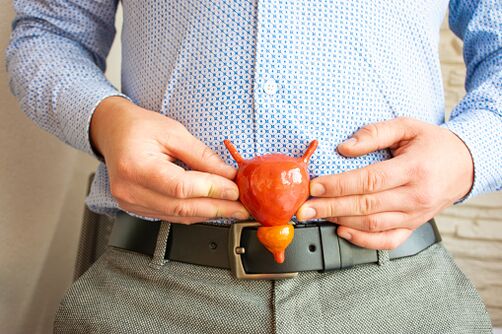Prostatitis is not the most pleasant disease that often becomes chronic. Any provocation from the side of behavior, well-being and symptoms come back: pain in the genital area, painful urination, unstable erections.

The first prevention against prostatitis is a simple healthy lifestyle with no special prohibitions. Secondary prevention of the onset of the disease is a series of measures that include diet, complete rejection of alcohol and, of course, appropriate medication.
What are the risk factors for the onset of the disease?
Prostatitis can develop from a combination of two factors: the appearance of an infection and stagnant processes in the body.
The most important sources of pathogens are:
- Intestines and diseases such as Escherichia coli, Klebsiella, Proteus, etc. ;
- a sexual partner with infectious diseases of the genitourinary system: chlamydia, mycoplasma;
- Sore throat, carious untreated teeth, sore tonsils;
- little physical activity.
All of this, individually and in total, can lead to the development of prostatitis.
Physical activity and prostatitis prevention
Low physical activity is the main reason for developing prostatitis in adults and young men. Prostatitis against the background of venous congestion in the pelvic organs is called congestive.
If a man leads an active, healthy lifestyle, his pelvic muscles are always in good shape. You will support the genitals in the correct position well enough and the whole system will work well.
No time for a gym and special classes? This is not a problem! Simple enough, but regular exercise and gymnastics every day. The exercises should be done for at least 15-30 minutes until the sweat is noticeable, that is, until light physical activity occurs.
Kegel exercises are great for warming up to prevent prostatitis. However, it is important to know that in the presence of kidney stones, they cannot be done.Preventing Prostatitis at Home Another good way to prevent prostatitis is light, brisk walking uphill, swimming and jogging are perfect.
With the right seat, a bicycle will do the same. It promotes blood flow to the pelvic organs. Cycling for 5-7 kilometers 2-3 times a week can be an excellent prevention against prostatitis.
Regular sexual intercourse plays an important role in preventing prostatitis. Sexual relationships shouldn't be "for show, " but rather against the backdrop of desire and mutual satisfaction. Bad orgasms are not the way to keep the prostate in good working order. Arousal should be real and hormones should be fine, only then will prevention workone hundred percent.
Separately, one should talk about the hygiene of sexual relations. This is also very important. Many partners trying to diversify their sexual intercourse simply forget about basic hygiene. Unprotected sexual intercourse often becomes the cause of a prostate infection and subsequently the development of prostatitis.
Proper nutrition, regular and high-quality sexual intercourse, the absence of bad habits - all of these together ensure good male health and the absence of prostate diseases.
Prostatitis prevention products
Proper nutrition and quality healthy foods help protect the body from harmful effects. Which foods are particularly helpful in protecting against the prostate? Here is just a small list:
- Pumpkin seeds. On an empty stomach, you should eat 30-40 seeds for at least 7 days in a row. It is useful to use them together with honey or nuts;
- fatty, omega-3-rich fish, including seafood;
- healthy herbs: parsley, lettuce, celery, basil;
- Walnuts.
Of course, diet plays an important role in preventing prostatitis and many other male health conditions.
Spicy dishes, evening beer, nuts salted with spices and crackers only provoke new symptoms of the development of the disease. Symptoms of illness can appear immediately after eating the wrong food. The treatment then has to start all over again.
Of course, don't forget to have regular medical examinations. After 40 years, all men must see a urologist at least every six months. Women should also see a gynecologist. At this age, the risk of developing prostatitis increases.






































